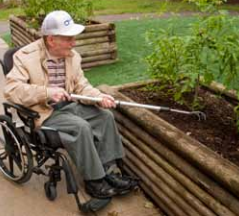Food Access: Community Garden Accessibility Webinar
Posted: February 25, 2015
Categories: Community Gardens / Food Access / GoodFoodBites / News from Sustain Ontario / Webinars / Working Group News
This webinar is the fourth in a series of conversations around food access and policy within our network and we invite you to take part. To learn more about the Food Access Peer Learning Circle (PLC) and how to be involved please contact Bronwyn Clement, bronwyn@sustainontario.ca
Join us from 3- 4:30pm on Wednesday, March 11th for a discussion on the work being done to improve the inclusiveness and accessibility of community gardens and how community gardens can comply with the Accessibility for Ontarians with Disabilities Act (AODA).
Go directly to the registration page here.
The Accessibility for Ontarians with Disabilities Act (AODA) is one of the world’s most progressive legislation on accessibility and is part of the Ontario Government’s goal to make the province accessible by 2025 through the development of accessibility standards. Particular to community gardens is the Design of Public Spaces Standard that ensures public spaces are accessible to everyone. Accessible public spaces include specific features that make it easier for everyone – people with disabilities, seniors and families – to use public spaces.

Image from “Barrier Free Community Gardening in Waterloo Region”
Community gardens are regarded as powerful community food assets and gathering places that offer access to land and foster sustainable food production practices. Equally as important, community gardens are spaces that encourage neighbourhood resilience and community building, foster intergenerational activity and social interactions, enable exercise, and help beautify streetscapes. And while community gardens are just one piece of a broader food movement, because community gardens can exist in any neighbourhood, they are one step to ensuring communities have access to healthy, fresh foods. To be successful, community members must feel welcome in these spaces and that includes physical accessibility.
The presentations in this webinar will both give an overview and details of the AODA legislation as well as the experience of community gardens that have undergone successful accessibility projects.
Our first presenter, Bonnie Yu from the Accessibility Directorate of Ontario, will provide:
- an overview of the Accessibility for Ontarians with Disabilities Act (AODA),
- highlights of the accessibility standards and legislative requirements,
- specific requirements under the Design of Public Spaces Standard and,
- free tools and resources to help community gardens in your community/town/region comply
Our second presenter, Carol Popovic, from the Healthy Eating and Active Communities project in Waterloo, will share about the collaborative work being done in numerous community gardens in the region to increase accessibility and the ways other community gardens across the province can implement similar projects.
Who’s presenting?
Carol Popovic is a Public Health Nurse from the Healthy Eating and Active Communities, Region of Waterloo Public Health. She provides staff support since 2005 to the Community Garden Council/Network of Waterloo Region. There are about 69 gardens in the Region; representing approximately 1690 plots. In 2009, a Diggable Communities Partnership formed which identified inclusion as one of its key priorities. Several projects arose from this collaboration; one of which was the accessible garden project. Carol will share their experience with this project.
Bonnie Yu is with the Accessibility Directorate of Ontario where she is a program advisor, working with the Public Education and Partnerships Unit on education and outreach initiatives related to the implementation of the Accessibility for Ontarians with Disabilities Act. She has been with the Ontario Government for over 10 years, holding a number of program related positions, and working with stakeholders to implement various pieces of legislation related to health, environment, and most recently initiatives related to accessibility.
Can you tell me more about the Food Access Peer Learning Circle?
Sustain Ontario is hosting a series of educational webinars and discussions to investigate, discuss, and share resources on a variety of food access topics. The peer learning circle (PLC) aims to be an avenue to strengthen existing collaborative networks, share knowledge and tools, support initiatives across the food community, and come to a place of agreement on policy ideas for the network and government to move forward on.
The Food Access Peer Learning Circle is one of four targeted learning circles to come out of Healthy Food for All: Healthy and Sustainable Food Systems in Ontario, a project intended to increase the capacity of local communities working towards a sustainable food system in Ontario.
Have a question or comment about accessibility and inclusivity of community gardens or the peer learning circle but can’t make it to the webinar? Post it in the comment section below and we’ll ask it for you during the webinar! Register for the webinar.
This webinar has emerged from requests from members of Ontario Community Garden Network to learn more about AODA.
Additional Resources
“Barrier Free Community Gardening in Waterloo Region.” Together for Health/Region of Waterloo Public Health.
“Integrated Accessibility Standards Regulations Guidelines. Part 4: Design of Public Spaces Standard.” Ontario Ministry of Community & Social Services. 2014.
One response to “Food Access: Community Garden Accessibility Webinar”
Leave a Reply
You must be logged in to post a comment.

I rent a community garden plot at Sunnidale gardens in Barrie. Not able to access my plot as the city continues to fill in curb cuts they have made. Those more mobile with plots must park across a busy street and park in a mall parking lot. Our councillor has been promising a parking lot for three years now-so much for accessability